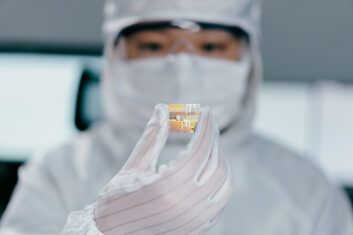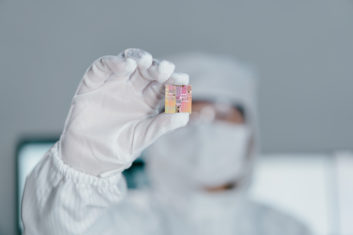Nanotechnology company Chiral has announced a $3.8m funding round to address the challenge of silicon-based chip shortages, innovating the way nanomaterials are integrated into devices. Its expertise in nanotechnology, automation, and high-precision robotics is said to be “pivotal” in the industry’s move beyond silicon to the next generation of electronics. The pre-seed funding round was co-led by Founderful (formerly Wingman Ventures) and HCVC and includes grants from ETH Zurich and Venture Kick.
Chipmaking has become one of the world’s most critical technologies in the last two decades. The main driver of this explosive growth has been the continuous scaling of silicon technology (widely known as Moore’s Law). But these advances in silicon technology are slowing down, as we reach the physical limits of silicon. For this reason, the industry has been investing heavily in nanomaterials like carbon nanotube, graphene and TMDs, which are expected to enable chips with unprecedented functionality. However, making electronic devices with these extremely small materials at speed, with precision, and without compromising on quality has been a long-standing obstacle.
Research has evidenced the use case and impact of nanomaterials across a range of electronics including high-performance transistors, low-power sensors, quantum devices, and many more. However, existing production methods, mostly based on chemistry, are not controllable, which has thus far prevented commercialisation of these devices.
Chiral has built high-speed, automated, robotic machines that integrate nanomaterials into devices. These machines can robotically place micrometer-sized (or even nanometer-sized) materials on small chips. Repeating these motions in a fast and automated manner requires a very high level of engineering, which, when done right, ensures the precision and control that conventional chemistry-based methods lack.
 The development of Chiral’s technology started as a national research project conducted at the Swiss Federal Institutes of Technology (ETH Zurich, EPFL, and Empa), in which the company’s co-founders, Seoho Jung, Natanael Lanz, and Andre Butzerin participated as PhD students. After 4 years of R&D, the research team finished its first prototype machine, which was 100 times faster than the other systems available at the time. The immediate reaction of the market to the prototype, which quickly led to the company’s first batch of pilot customers, convinced the co-founders that they should continue their activity as a company. They incorporated Chiral in June 2023 as a result.
The development of Chiral’s technology started as a national research project conducted at the Swiss Federal Institutes of Technology (ETH Zurich, EPFL, and Empa), in which the company’s co-founders, Seoho Jung, Natanael Lanz, and Andre Butzerin participated as PhD students. After 4 years of R&D, the research team finished its first prototype machine, which was 100 times faster than the other systems available at the time. The immediate reaction of the market to the prototype, which quickly led to the company’s first batch of pilot customers, convinced the co-founders that they should continue their activity as a company. They incorporated Chiral in June 2023 as a result.
“At Chiral, we are pioneering the next generation of electronic devices across industry,” explained Seoho Jung, co-founder and CEO at Chiral. “Chipmakers are aware of the potential of nanomaterials and we’re bringing that potential to life. This funding will accelerate the development of our next machine, which will unlock new market opportunities with its versatility and performance. We are also excited to scale our team to keep up with the growing demand and customer base.”
The global nanotechnology market size is projected to grow from $79.14 billion in 2023 to $248.56 billion by 2030, at a CAGR of 17.8% (Fortune business insights research). One of the largest chipmakers in the world, Taiwan Semiconductor Manufacturing Company (TSMC) presented its development roadmap showing nanomaterial-based transistors as its future architecture.
 “We’re thrilled to join forces with Chiral alongside HCVC,” said Pascal Mathis, founding partner at Founderful. “Chiral’s AI- and robotics-based technology lets us envision a future where nanomaterial-based chips are being produced at the scale needed for commercialisation – a major bottleneck up until now. We look forward to supporting Seoho, Natanael and André in their journey to introduce a new paradigm of chips beyond silicon.”
“We’re thrilled to join forces with Chiral alongside HCVC,” said Pascal Mathis, founding partner at Founderful. “Chiral’s AI- and robotics-based technology lets us envision a future where nanomaterial-based chips are being produced at the scale needed for commercialisation – a major bottleneck up until now. We look forward to supporting Seoho, Natanael and André in their journey to introduce a new paradigm of chips beyond silicon.”
Alexis Houssou, founding partner at HCVC, added: “With the current boom in AI applications, we stand at a pivotal moment where the slowdown of Moore’s law threatens to decelerate the pace of technological progress significantly. The team at Chiral has embarked on a critical mission to pave the way toward a groundbreaking post-silicon era, promising to transcend current limitations and unlock new possibilities for advancement. We couldn’t be more excited to support their mission, in collaboration with Founderful, as they build the future of computing infrastructure.”
Jung concluded: “In the future, it will be normal for electronic devices or chips to contain nanomaterials. The development roadmaps of the world’s leading chipmakers like TSMC, Samsung, and Intel all share our vision. We are confident that Chiral technology will empower the industry to make this transition faster.”







